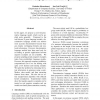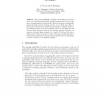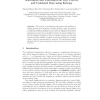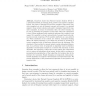AI
2004
Springer
15 years 1 months ago
2004
Springer
A version space is a collection of concepts consistent with a given set of positive and negative examples. Mitchell [Mit82] proposed representing a version space by its boundary s...
104
click to vote
AAAI
2006
15 years 3 months ago
2006
Assume that we are trying to build a visual recognizer for a particular class of objects--chairs, for example--using existing induction methods. Assume the assistance of a human t...
108
click to vote
ACL
2007
15 years 3 months ago
2007
In this paper, we propose a novel discriminative language model, which can be applied quite generally. Compared to the well known N-gram language models, discriminative language m...
138
click to vote
ECML
1998
Springer
15 years 6 months ago
1998
Springer
Previous bias shift approaches to predicate invention are not applicable to learning from positive examples only, if a complete hypothesis can be found in the given language, as ne...
125
click to vote
IEAAIE
2001
Springer
15 years 6 months ago
2001
Springer
The growing availability of online text has lead to an increase in the use of automatic knowledge acquisition approaches from textual data, as in Information Extraction (IE). Some ...
120
click to vote
WAIM
2010
Springer
15 years 7 months ago
2010
Springer
Abstract. The problem of classification from positive and unlabeled examples attracts much attention currently. However, when the number of unlabeled negative examples is very sma...
100
click to vote
ILP
2003
Springer
15 years 7 months ago
2003
Springer
In the case of concept learning from positive and negative examples, it is rarely possible to find a unique discriminating conjunctive rule; in most cases, a disjunctive descripti...
115
click to vote
INEX
2005
Springer
15 years 7 months ago
2005
Springer
Abstract. This paper explores the possibility of using a modified Expectation-Maximization algorithm to estimate parameters for a simple hierarchical generative model for XML retr...
119
click to vote
ICDE
2005
IEEE
15 years 7 months ago
2005
IEEE
With the increasing amount of biomedical literature, there is a need for automatic extraction of information to support biomedical researchers. Due to incomplete biomedical inform...
121
click to vote
ICFCA
2007
Springer
15 years 8 months ago
2007
Springer
Kuznetsov shows that Formal Concept Analysis (FCA) is a natural framework for learning from positive and negative examples. Indeed, the results of learning from positive examples (...




